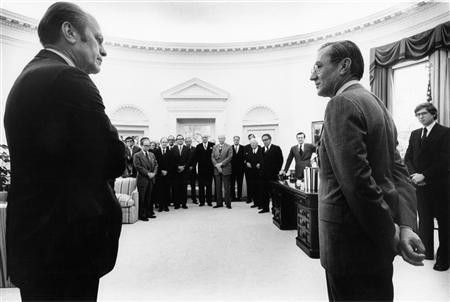Film looks at life of ex-spymaster William Colby

When the body of former CIA director William Colby was found underwater near his vacation home in Rockpoint, Maryland 15 years ago, no one suspected murder, but his son Carl Colby has never ruled it out.
Carl Colby's new film documentary, The Man Nobody Knew: In Search of My Father, CIA Spymaster William Colby opens in major U.S. cities this month and takes audiences on a journey through the life of a complicated man who helped shape Vietnam war strategy and was partly responsible for a major shake-up at the U.S. Central Intelligence Agency.
In May 1996, Colby went missing for eight days. He had gone canoeing, and is believed to have fallen into the water and drowned or suffered hypothermia. The cause of death was always thought to be a heart attack, but there can be little doubt Colby made plenty of enemies over the years.
You could say the best way to get rid of a body is to throw it in the water because you can't see any signs of abuse or injury, Carl told Reuters. Everybody in our family always wore a life vest, so why would he not wear a life vest?
In fact, Carl is not certain what to make of his father's death -- murder, suicide, accident or fate. Nor does he know what to make of his father's life -- hero, victim or villain.
But he went looking and the result is his documentary, for which he interviewed former U.S. government officials such as Donald Rumsfeld, Robert Gates and James Schlesinger, along with journalists like Seymour Hirsch and Bob Woodward.
In the 1960s William Colby, a CIA operative since World War II, oversaw the coup d'etat against Vietnamese President Diem and masterminded an anti-incursion strategy called the Phoenix Program to root out the Viet Cong in towns and villages.
Thousands of people were killed, but the program was singled out after the war by Viet Cong Commander Vo Nguyen Giap as being most effective. Today, Phoenix is a blueprint for other anti-insurgency campaigns.
When it comes to the Diem murder, you start to think, 'Wow, he didn't just know about this, he may have been a part of this, Carl concludes about his father's role in the assassination of a man he called his friend.
SEPT. 11, CHURCH COMMITTEE
Carl Colby finally decided to make a movie about his father on September 11, 2001 after former Secretary of State James Baker traced the attack back to the Church Committee hearings of 1975 investigating abuses by the CIA, claiming it crippled the organization's ability to collect intelligence.
Williams Colby's testimony before the Church Committee became pivotal when he revealed the CIA's family jewels, a series of clandestine and illegal activities such as secret prisons, warrantless wiretaps and assassination plots.
He would come home and I'd say, 'You're spilling the beans! You're volunteering information they're not even asking you for! remembers Carl. He said, 'So they'll learn about these secrets. Place needs a housecleaning.' He ended up taking the heat and falling on his sword but he saved the agency.
I felt a lot of respect for him around the times of the hearings because he was doing the unpopular thing and he was vilified, notes Carl. The conservatives thought he's giving away the farm. The old boys hated him at the agency. He was sort of a man without a country.
In 1976, William Colby was replaced as CIA Director by George H.W. Bush. Among the first things Colby did was divorce his wife of 40 years, remarrying a few months later. Carl recalls a family member asking his father what was more important to him, his family or his career. He didn't even bother to lie, laments the filmmaker.
Toward the end of his life, William Colby learned of an old friend found under a bridge suffering from Alzheimer's. He said, 'that's never going to happen to me,' remembers Carl. One day you're just going to hear that I was walking on a goat path in the Greek islands and I fell to the sea.
Although questions still surround his father's death, Carl feels it was just as likely a case of suicide as murder. He lost Vietnam, he lost his job, but I think he felt like he wanted to be the master of his destiny, Carl said. He would have loved to just fade into the distance like the fog.
© Copyright Thomson Reuters 2024. All rights reserved.





















